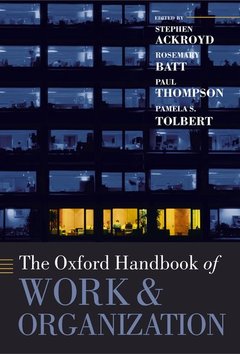The Oxford Handbook of Work and Organization Oxford Handbooks Series
Langue : Anglais
Coordonnateurs : Ackroyd Stephen, Batt Rosemary, Thompson Paul, Tolbert Pamela S.

The last twenty-five years of the twentieth century was a period of extraordinary change in organizations and the economies of the developed world. This continues today. Such has been the scale and momentum of events that, for some analysts, the only comparable periods are the early part of the twentieth century in which the shift to mass production and large-scale organization was accomplished, or the industrial revolution itself a hundred years earlier. Researchers in Europe and the USA in particular have been studying change in work and organizations, but there has been little attempt to systematize and draw together the results of their work. So far, the emphasis amongst writers on organizations considering the problem of contemporary change has been on ways of conceptualizing events, rather than also considering evidence. But what has actually happened? How much of the flux of events is real change, and how much mere change in emphasis in which apparent change is overlaying organizational continuity? How far are changes in particular events and sectors connected, and is an overall understanding of complex processes possible? The Oxford Handbook of Work and Organization aims to bring together, present and discuss what is currently known about work and organizations and their connection to broader economic change in Europe and America. Issues of conceptualization are not neglected but, in contrast to other comparable volumes, the emphasis is firmly on what is known what and has been observed by researchers. The volume contains a range of theoretically informed essays, written by leading authorities in their respective fields, giving comprehensive coverage of changes in work, occupations, and organizations. It constitutes an invaluable overview of the accumulated understanding of research into work, occupations and organizations in recent decades. It shows that in almost every aspect of economic institutions, change has been considerable. The subject area of work, occupations and organizations is considered in four major sections of the volume: I, Work, Technology, and the Division of Labour; II, Managerial Regimes and Employee Responses; III, Occupations and Organizations; and IV, Organizations and Organized Systems. In this way the contemporary situation in work and organizations is considered extensively in its different dimensions and interconnections. The contributors have been selected for their expertise and include many leading authors in organizational analysis and substantive research. The handbook is thus an authoritative statement, and offers a valuable account of organizations at this time.
Stephen Ackroyd, Rose Batt, Paul Thompson, and Pamela S. Tolbert: Introduction, Section. Part 1: Work. Technology, and the Division of Labor, 1: Jill Rubery: Labor Markets and Flexibility, 2: Eileen Appelbaum, Tom Bailey, Peter Berg, and Arne Kalleberg: Organizations and the Intersection of Work and Family: A Comparative Perspective, 3: Leslie McCall: Gender, Race, and the Restructuring of Work: Organizational and Institutional Perspectives, 4: Colin Crouch: Skill Formation Systems, 5: Richard Badham: Technology and the Transformation of Work, 6: Rose Batt: Groups at Work, Section. Part 2: Managerial Regimes and Employee Responses. 7: David Strang and Young-Mi Kim: The Diffusion and Domestication of Managerial Innovations: The Spread of Scientific Management, Quality Circles, and TQM between the US and Japan, 8: Gideon Kunda and Galit Ailon-Souday: New Designs: Design and Devotion Revisited, 9: Karen Legge: Human Resource Management, 10: Alan McKinlay: Knowledge Management, 11: Harry Katz: Industrial Relations and Work, 12: John Kelly: Labour Movements and Mobilization, 13: David Collinson and Stephen Ackroyd: Informal Resistance, Section. Part 3: Occupations and Organizations. 14: Laurie Graham: Manual Workers: Conflict and Control, 15: Steve Frenkel: Service Workers in Search of Decent Work, 16: Steve Barley: Craft and Technology, 17: Bob Hinnings: Professions, 18: Paul Osterman and Diane Burton: Ports and Ladders: The Nature and Relevance of Internal Labor Markets in a Changing World, Section. Part 4: Organizations and Organized Systems. 19: Stephen Procter: Organisations and Organised Systems: From Direct Control to Flexibility, 20: Mats Alvesson and Paul Thompson: Post-bureaucracy?, 21: Grahame Thompson: Inter-firm Relations As Networks, 22: Bob Hebdon and Ian Kirkpatrick: Changes in the Organisation of Public Services and Their Effects on Employment Relations, 23: Glenn Morgan: Understanding Multinational Corporations, 24: Bill Lazonick: Corporate Restructuring, 25: Chris Smith: Business Practices and Societal Effects
Stephen Ackroyd is Professor of Organizational Analysis, and Head of the Department of Organization, Work, and Technology, at the Lancaster University Management School. He is author of several books on Organization, most recently The Organization of Business (OUP, 2002). He is also a Fellow, and elected member of the Council, of the British Academy of Management, and a Fellow of the Royal Society of Arts. Rosemary Batt is the Alice H. Cook Professor of Women and Work, New York State School of Industrial and Labour Relations, Cornell University. She has published widely on issues of Industrial Relations and Human Resource Management. Paul Thompson is Professor of Organizational Analysis and Vice Dean (Research) at the Strathclyde Business School, University of Strathclyde. He is author of Work Organisations (Palgrave, 3rd edition 2002) with David McHugh, and Organizational Misbehaviour (Sage, 1999) with Stephen Ackroyd. He is also co-organizer of the International Labour Process Conference. Pamela S. Tolbert is the Professor of Organizational Behaviour, and Chair of the Department of Organizational Behaviour, at the New York State School of Industrial and Labour Relations, Cornell University. Her work on organizations and occupations has been published in a wide array of organization studies and sociology journals, and she is author of Organizations: Structure, Process, and Outcomes (Prentice Hall, 2004) with Richard Hall. She has served onthe eidtorial boards of a number of journals, including Administrative Science Quarterly, American Sociological Review, Management Science, and Organization Science.
Date de parution : 05-2006
Ouvrage de 680 p.
17.2x24.6 cm
Date de parution : 12-2004
Ouvrage de 680 p.
17.8x25.4 cm
© 2024 LAVOISIER S.A.S.



